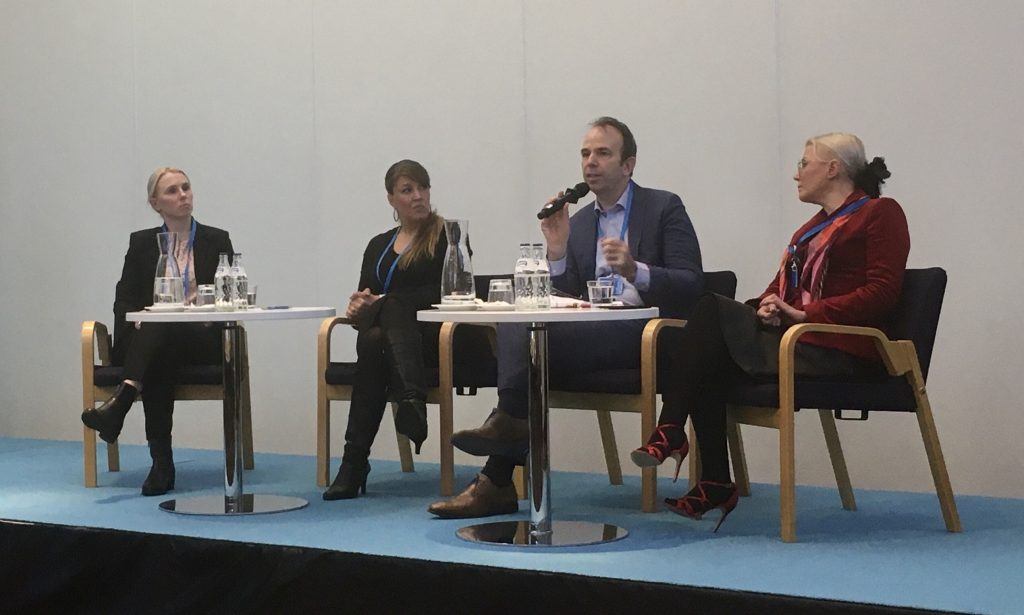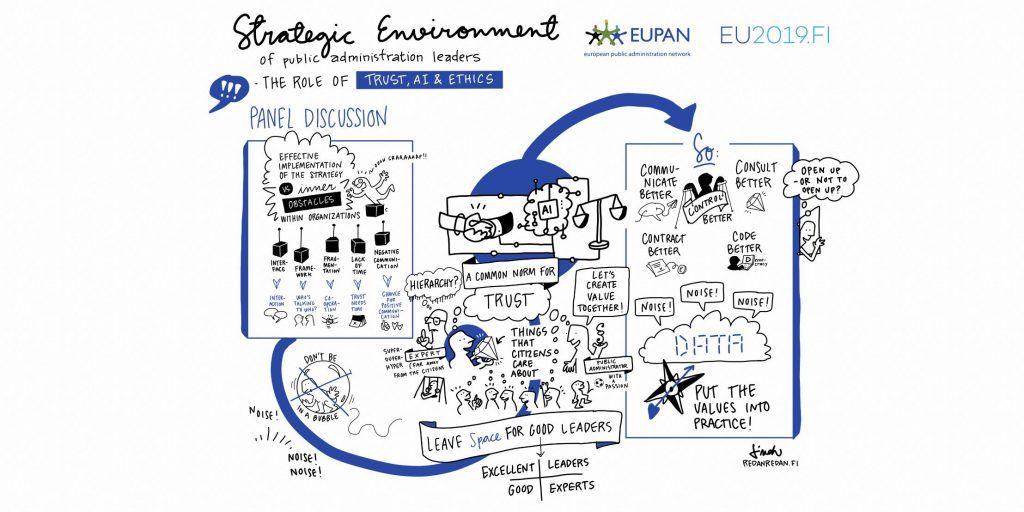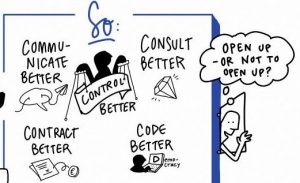The 4 Cs to More Ethical, Transparent, and Accountable Public Administrations
Las 4 C necesarias para lograr administraciones públicas más éticas, transparentes y que rinden cuentas
The 2020 Edelman Trust Barometer reveals that despite a strong global economy and near full employment, citizens don’t trust their governments. This result, seen across other studies, is a clear wake-up call for institutions to embrace a new way of effectively building trust. By opening their doors to public input and oversight, we know that governments are more likely to be effective and credible. A mere technical fix will not be enough, it is rather about changing the culture of government, the DNA of decision making. But, with declining trust in institutions, liberal democracy at threat, and rising populism, we need these challenges to be faced head-on. We often talk about the role of politicians in fixing the trust deficit, but what can bureaucracies do?
A few months back, I had the opportunity to speak at the European Public Administration Network (EUPAN) Directors General Meeting in Helsinki, Finland, about opportunities for stronger engagement between public administrations, civil society and citizens directly. The Director Generals present stressed a shared responsibility to make their administrations stronger – more ethical, transparent and accountable. They emphasized that the basis for trust is citizens’ satisfaction with the delivery and quality of public services.

Paul Maassen, OGP’s Chief of Country Support, speaks on a panel about the role of trust, AI, and ethics in public administration at the 2019 EUPAN DG Meeting in Helsinki, Finland.
As an action-driven platform, OGP encourages its 78 national members and growing number of local members to link global conversations with domestic dialogue and action. Public administrations should be listening to citizens, making use of their knowledge and responding to their feedback by showing the concrete results of their engagement. Here are four ways – or rather the four Cs – public administrations can build trust, partnerships, and accountability:
- Communicate better, and remember that civil servants are citizens too.
- Find opportunities to not be a faceless bureaucracy and to use low-tech solutions to engage citizens.
- Finland communicates with citizens through plain language, while the Dutch public administration calls people who submit freedom of information requests. Such informal approaches lead to fewer complaints, lower overall costs and shorter lead times – improving public trust! That’s how simple it can be.
- Consult better, but less often.
- Consultation is what you do when you need feedback, when you’re looking for ideas, when you want technical inputs or public buy-in. Think carefully about what you’re looking to get out of it, and who you need to reach. The method has to match the goal. Some governments in OGP, including Canada and the Netherlands, have created internal expertise centers that help design appropriate consultations – and do it in a way that appeals to both stakeholders and bureaucrats because it is in everyone’s interest.
- Consult on topics citizens care about. In Estonia, following a wave of citizen protests in response to a major party finance scandal, citizens crowd-sourced, prioritized and voted on key policy proposals to tackle the roots of the problem. This online and offline deliberation and voting method eventually led to a permanent Citizen Initiative Portal, rahvaalgatus.ee and numerous citizen assemblies on the future of aging, sustainable forestry and issues of a shrinking population.
- Contract better.
- Proactively disclosing information related to procurement tenders and contracts plays an important role in holding government officials to account, as well as incentivizing competition. This ultimately strengthens trust in public administration.
- In Ukraine, when oligarchs had captured the public contracting process, tech-savvy activists and government reformers created the open contracting online platform ProZorro. The platform not only saved money, but also created trust and a level playing field for the private sector, raising the number of bidders and government suppliers. In Slovakia, procurement contracts are only valid if they’re published online. Almost all OGP members use the OGP platform to open up contracting.
- Code better.
- Most governments are lagging behind in harnessing the power of digital tools, leading to an inability to make good decisions in the face of change and uncertainty. Evidence shows that even in 2020 democracies are the target of foreign online disinformation campaigns.
- We are seeing some new approaches to digital governance, such as France, the Netherlands, and New Zealand committing to improving the accountability of government use of AI & algorithms that impact our lives, Australia using deliberative approaches to build an ethical framework on AI or Canada committing to strengthen electoral laws to increase transparencyAccording to OGP’s Articles of Governance, transparency occurs when “government-held information (including on activities and decisions) is open, comprehensive, timely, freely available to the pub... More around how voters are targeted by traditional and online and advertising.

Graphic Recording of EUPAN DG Meeting Panel on The Role of, Trust, AI, and Ethics in Public Admin
Illustration by Linda Saukko Rauta
Quality public services are critical to the lives of citizens and ensuring their provision is an essential function of governments. Experience and evidence have however shown that this is not the government’s role alone, but that citizens and civil society also have an important part to play in improving and delivering public services and achieving social outcomes. Governments need to open up to public input and oversight, and they need to do it in a meaningful way, well designed, with real willingness to listen and change, on topics citizens care about.
Consultation is an art. It takes time to get this right – it won’t all click into place overnight. But it could not be more important than today. Only real evidence, real dialogue, and real action that will make a difference in people’s lives can combat the rise of populism and distrust.
The featured illustration was created by Linda Saukko Rauta.
El Barómetro de Confianza Edelman de 2020 reveló que, a pesar de que la economía global y los niveles de empleo son buenos, la ciudadanía aún no confía en sus gobiernos. Este hallazgo, que también ha surgido en otros estudios, es un llamado a las instituciones a trabajar en nuevas formas de fortalecer la confianza. Sabemos que, cuando los gobiernos le abren las puertas a las aportaciones y la retroalimentación del público, tienden a ser más efectivos y confiables. Para ello, será necesario cambiar la cultura del gobierno, el ADN de la toma de decisiones. Con la confianza en el gobierno debilitada, amenazas a la democracia y el alza del populismo, necesitamos enfrentar estos retos directamente. Con frecuencia hablamos del papel que tienen los políticos para resolver el problema del déficit de confianza, pero ¿Qué pueden hacer las burocracias?
Hace algunos meses, tuve la oportunidad de hacer una presentación en la reunión de directores de Red Europea de Administración Pública (EUPAN por sus siglas en inglés) que se llevó a cabo en Helsinki, Finlandia sobre las oportunidades que existen para una mayor colaboración entre los administradores públicos, la sociedad civil y la ciudadanía. Los directores que participaron en la reunión enfatizaron que tienen una responsabilidad compartida de fortalecer sus administraciones y hacerlas más éticas y transparentes y lograr que rindan cuentas. Enfatizaron que la base de la confianza es el nivel de satisfacción que tiene la ciudadanía con la provisión y la calidad de los servicios públicos.

Paul Maassen, OGP Chief of Country Support speaks on a panel about the role of trust, AI, and ethics in public administration at the 2019 EUPAN DG Meeting in Helsinki, Finland.
Como plataforma que busca promover las acciones, OGP invita a sus 78 miembros nacionales y gobiernos locales a vincular las conversaciones globales con acciones locales. Las administraciones públicas deben escuchar a su ciudadanía, utilizar su conocimiento y responder a su retroalimentación, mostrando los resultados concretos de su participación. A continuación presentamos cuatro formas en que las administraciones pueden construir confianza, establecer alianzas y lograr la rendición de cuentas:
- Comunicar mejor y recordar que los funcionarios también son ciudadanos.
- Encontrar oportunidades de dar la cara al público y utilizar soluciones de baja tecnología para colaborar con la ciudadanía.
- Finlandia se comunica con sus ciudadanos utilizando un lenguaje sencillo, mientras que la administración pública de los Países Bajos llama a los ciudadanos que envían solicitudes de información. Estos métodos informales han logrado reducir el número de quejas, disminuir los costos y los tiempos de espera lo cual, a su vez, mejora la confianza ciudadana. Así de simple puede ser la solución.
- Consultar mejor, pero con menor frecuencia.
- Las consultas se realizan cuando quieres solicitar retroalimentación, cuando estás buscando ideas y cuando buscas obtener insumos técnicos o apoyo político. Piensa cuidadosamente qué quieres obtener y a quién debes involucrar. El método debe corresponder con el objetivo. Algunos gobiernos de OGP, incluyendo Canadá y los Países Bajos, han creado centros para diseñar procesos adecuados para las consultas que sean atractivos tanto a los actores como a los burócratas.
- En los procesos de consulta, incluir los temas que le interesan a los ciudadanos. En Estonia, tras una ola de protestas ciudadanas que surgieron como respuesta a un escándalo de financiamiento a partidos, los ciudadanos identificaron y priorizaron propuestas de políticas diseñadas para abordar las causas del problema. Este método de toma de decisiones, en línea y en persona, llevó a la creación de un portal para iniciativas ciudadanas rahvaalgatus.ee y diversas asambleas ciudadanas sobre el futuro del envejecimiento, el manejo forestal sustentable y la población en declive.
- Contratar mejores.
- Publicar información relacionada con licitaciones y contratos es importante para asegurar la rendición de cuentas de los funcionarios e incentivar la competencia. A su vez, esto mejorará la confianza en la administración pública.
- En Ucrania, la oligarquía había capturado los procesos de contratación pública. En se contexto, un grupo de activistas con conocimientos en tecnología y reformadores crearon la plataforma de contratación abierta ProZorro. Además de generar ahorros, la plataforma ha ayudado a fortalecer la confianza y a establecer condiciones de competencia justa para el sector privado, con lo que ha aumentado la cantidad de proveedores que participan en las licitaciones. En Eslovaquia, los contratos de procuración no son válidos si no se publican en internet. Casi todos los miembros de OGP han utilizado a OGP para abrir los procesos de contratación.
- Codificar mejor.
- La mayoría de los gobiernos no han aprovechado del todo el potencial de las herramientas digitales, lo cual ha llevado a una falta de capacidad de tomar decisiones en tiempos de cambio e incertidumbre. Existen evidencias que demuestran que incluso en el 2020 algunas democracias han sido víctimas de campañas de desinformación en línea.
- Están surgiendo nuevas herramientas de gobernanza digital como en el caso de Francia, Países Bajos y Nueva Zelanda que se han comprometido a aumentar la rendición de cuentas del gobierno con respecto al uso de la inteligencia artificial y los algoritmos que afectan nuestras vidas. Australia, por su parte, está desarrollando un marco ético de inteligencia artificial, mientras que Canadá se comprometió a fortalecer sus leyes electorales para fortalecer la transparencia con respecto a la publicidad dirigida a votantes.

Graphic Recording of EUPAN DG Meeting Panel on The Role of, Trust, AI, and Ethics in Public Admin
Illustration by Linda Saukko Rauta
Los servicios públicos de calidad son fundamentales para la vida de los ciudadanos y asegurar su oferta es una función elemental de los gobiernos. Sin embargo, la experiencia demuestra que no solamente es responsabilidad del gobierno, sino que la ciudadanía y la sociedad civil también tienen un papel en la provisión de los servicios públicos y en el logro de metas sociales. Los gobiernos deben estar abiertos a las aportaciones y la retroalimentación del público. Dicha apertura debe ser significativa, estar bien diseñada y tener la disponibilidad de escuchar y aplicar los cambios necesarios sobre los temas que importan a la ciudadanía.
La consulta es un arte. Toma tiempo hacerlo bien, por lo que no todo se resolverá en un día. Pero hoy es más importante que nunca. Solamente con evidencias verdaderas, diálogos verdaderos y acciones verdaderas lograremos hacer una diferencia en la vida de las personas y combatir el populismo y la desconfianza.
La ilustración presentada fue creada por Linda Saukko Rauta.


Leave a Reply